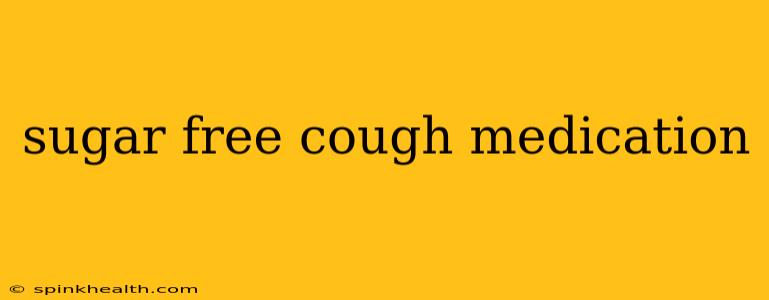Ah, the dreaded cough. That persistent tickle in your throat, the rattling in your chest – it's enough to drive anyone crazy. And when you're already feeling under the weather, the last thing you want is to add extra sugar to the mix. Fortunately, finding sugar-free cough medication is easier than you might think. This guide will navigate you through the options, addressing common questions and concerns.
What are the best sugar-free cough medications available?
The best sugar-free cough medication for you depends on the type of cough you have – dry or productive (wet) – and any other sensitivities or allergies you might have. Many over-the-counter (OTC) brands offer sugar-free formulations. Look for products explicitly labeled "sugar-free," "no sugar added," or "sucrose-free." Always check the label carefully to ensure it meets your needs and doesn't contain any ingredients you're allergic to. Some common active ingredients include dextromethorphan (for dry coughs) and guaifenesin (for productive coughs).
Are all sugar-free cough syrups the same?
No, absolutely not! Just because a cough syrup is sugar-free doesn't mean they're all created equal. They differ in active ingredients, focusing on addressing dry versus wet coughs. They also vary in inactive ingredients, like flavorings and preservatives, which can affect taste and potential sensitivities. Some may use artificial sweeteners, while others might opt for natural alternatives. Reading labels meticulously to understand the components is crucial. Don't hesitate to consult a pharmacist for personalized recommendations based on your specific cough and health needs.
What are the active ingredients in sugar-free cough suppressants?
Common active ingredients in sugar-free cough suppressants include:
- Dextromethorphan (DXM): This is a cough suppressant that works on the cough center in your brain, reducing the urge to cough. Many sugar-free cough syrups contain DXM.
- Guaifenesin: Unlike DXM, guaifenesin is an expectorant. It thins mucus, making it easier to cough up, which is beneficial for productive coughs. You'll find many sugar-free formulations containing guaifenesin.
Can I make my own sugar-free cough syrup at home?
While many home remedies are touted for cough relief, it's crucial to remember that homemade remedies are not regulated in the same way as over-the-counter medications. While some natural ingredients, like honey (if tolerated) or warm lemon water, might offer soothing relief for a mild cough, they are not a substitute for medication if you have a severe or persistent cough. Always consult a doctor before attempting homemade remedies, especially if you have underlying health conditions. Improper preparation or ingredients could be harmful.
What are some natural remedies for a cough?
Beyond medication, several natural remedies might provide some relief from a cough. These are often best used for mild coughs and in conjunction with rest and hydration:
- Rest: Your body needs rest to heal. Getting adequate sleep is essential for recovery.
- Hydration: Drinking plenty of fluids, such as water, clear broths, or herbal teas (avoid caffeinated beverages), helps thin mucus.
- Humidifier: A humidifier adds moisture to the air, which can soothe a dry, irritated throat.
- Gargle with salt water: Gargling with warm salt water can help soothe a sore throat.
Disclaimer: This information is for general knowledge and informational purposes only, and does not constitute medical advice. Always consult a healthcare professional for any health concerns or before making any decisions related to your health or treatment.

